Everyone still wants to know, does my cat love me? And now, thanks to technology and an increased understanding of the human-cat relationship, we can take a better look at whether your cat misses you when you’re gone.

Are cats aloof loners who don’t miss you? Or are they secretly pining away for your return while you are at work? Cats have a reputation for being a low-maintenance pet. Throw down some food and a litter box, and they’re fine, right? But I think the reputation is a bit overblown. It used to drive me nuts when I worked in an animal shelter and the adoption staff would direct someone toward adopting a cat because they worked too much for a dog. Cats have needs, and although they don’t need to be taken for a walk to go to the bathroom like dogs do, it doesn’t mean they don’t need exercise, affection, and other mental stimulation to keep them engaged. I believe this “low-maintenance” stereotype is often the culprit when it comes to people experiencing behavior problems with their cats.
That said, we know very little about what cats do when we are gone, and about the cat-human relationship. A new open-access study, “Cats and owners interact more with each other after a longer duration of separation” looked at what happens when humans leave from and return to the home, to see if cats showed any signs of what is known as “separation distress.”
The study was conducted with fourteen cats, in their homes, in Sweden. The cats normally spent most of their time indoors, and if they were allowed outdoors, it was only with supervision. The cats were tested on two consecutive days: on one day, the owner departed for 30 minutes, and on the other day, the owner was gone for four hours. All cats experienced both conditions, and the order of conditions was balanced, meaning that for some cats, the owner was gone for 30 minutes on the first day, and for other cats, the owner was gone for four hours on the first day.
Digital cameras were used to record the cats’ behaviors and vocalizations, and owners’ behavior when leaving and returning. Behaviors noted included resting, playing, grooming, walking, sitting, attention to owner, meowing, and purring (you can download a list of all the behaviors here). The cats were on camera for about 70% of the time guardians were gone. So, what happened when the guardians left?
Well, not too much. There were no differences in human or cat behavior before the guardian left or while they were gone. Cats spent more of their time resting during the longer separation.
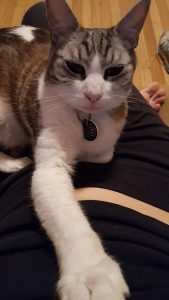
When guardians returned, cats were more likely to purr and stretch after the four-hour separation, than the short period of separation. Guardians were more likely to talk to their cats when they returned if they were gone for a longer time, but the purring and stretching were not dependent on that human interaction. This suggests that the cats may have noticed that their human was absent for a longer period, although it is unclear what the stretching indicates.
My guess? That the cats were taking a bit of a siesta during that longer absence (as cats often stretch when they first wake up) – which was interrupted by their human’s return.
Did the cats miss their humans? I don’t think this study provides us with a slam dunk either way. I love that the study looked at cats’ natural behaviors in their homes, and I think it’s great starting point for looking at how cats respond to human absence and presence. But the sample size is quite small, and as most research does to me, I was left with more ideas and questions than answers.
It would be great to look at cats’ activity patterns through the day, and how those are dictated by human activity. One challenge with videorecording is that when the cat is off camera, you don’t know what they are doing.
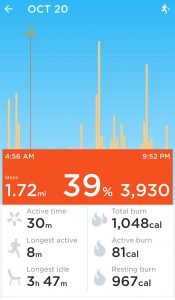
I recently put a Jawbone UP on my cat to see how active she is and when. What I can see is that when I’m sleeping, she’s sleeping. And that she has clear patterns of activity that reflect, to an extent, our activity in the home (note: this is not a scientific result!). In fact, I could match my fitness tracker with hers (correcting for when I’m not home, of course) and compare. Hmmm, I think I just came up with my next research project.
I also think that four hours isn’t necessarily long enough to know about how cats really respond to human absence. I don’t know what the work culture is like in Sweden, but most of my kitty clients are gone eight to twelve hours a day (if not more) if they work outside the home.
If the guardian absence wasn’t routine, and since it was different in each day of the experiment, we may not see the same level of greeting behaviors that some of us see when we come and go on a strict schedule. Just like dogs, I’ve seen many situations where cats anticipate their human’s return from work, and greet them at the door or show increased activity at that time.
Unfortunately, there is still a lot we don’t know about separation anxiety in cats, partly because we tend to use dogs as a reference point. Many dogs exhibit overt signs of separation anxiety, which can cause great stress for dog and human alike. Cats may show signs of distress that are less obvious – such as hiding, withdrawing from human interaction, or even sickness behaviors, which we know are triggered by stress and changes in routine.
Until we know more, I think we should assume that cats have needs while we are gone, and even if they aren’t meeting us at the front door. Most of us have to leave the home regularly, but I think that leaving your cat with bird feeders to watch, a sun spot to snooze in and a food puzzle to play with while you’re gone, and providing them with a structured routine including exercise and affection when you’re home are a great way to head off any separation distress at the pass!
References
Eriksson, M., Keeling, L. J., & Rehn, T. (2017). Cats and owners interact more with each other after a longer duration of separation. PloS one, 12(10), e0185599.
Stella, J. L., Lord, L. K., & Buffington, C. T. (2011). Sickness behaviors in response to unusual external events in healthy cats and cats with feline interstitial cystitis. Journal of the American Veterinary Medical Association, 238(1), 67-73.

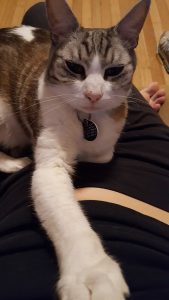
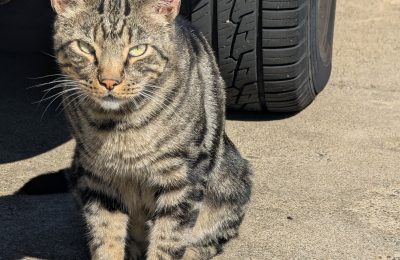
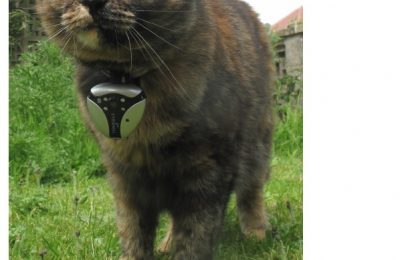
2 thoughts on “Does your cat miss you when you’re gone? Science starts taking a look.”
Comments are closed.